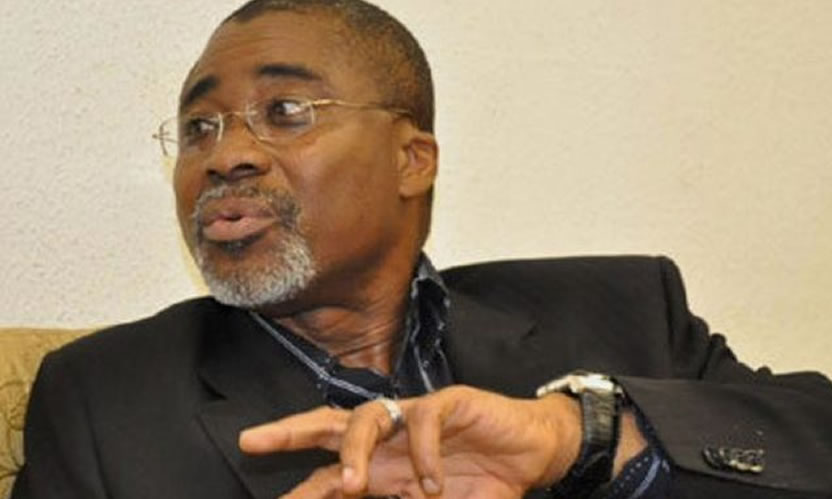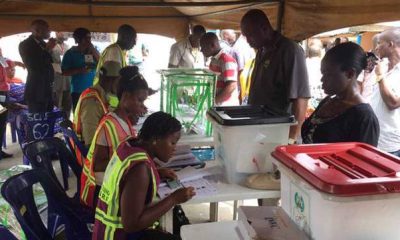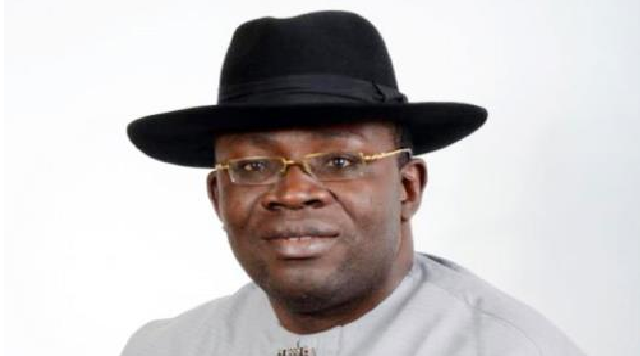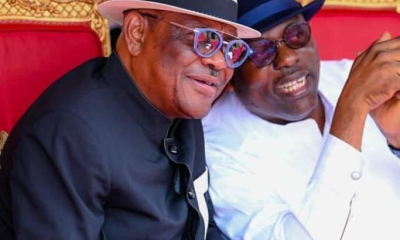OPINION
This Soup is Naked, Let’s Reposition Democracy in Nigeria

By Adebukola Osunyikanmi
The taste of homely soup illustrates the state of a democracy. A conversation between a mother and her daughter. An innocent discussion on socio-economic situations of an average Nigerian family. An expository revelation of status of most people who have sworn allegiance to be faithful, loyal and honest, and serve Nigeria with all strengths required to make our fatherland a regional and global giant.
Soup and its contents not only reveal the standard of living of the family, it also defines the skills and discipline of the cook.
The soup and its contents, its nourishment to the body and the satisfaction it offers are all indicators of personal well-being. From an innocent child’s viewpoint, the soup is naked if it lacks contents that can guarantee nourishment and sustenance of good health. From the foregoing, we can glean a deeper understanding of contemporary Nigeria and her democracy. This soup is naked. Nigeria’s democratic practice is essentially naked. Ours is a democracy that is characterized by quadriplegic challenges: leaders without vision, blind followers, weak institutions and corrupt electoral process. Nigeria’s democracy is a system that is devoid of its essential contents.In every democracy, citizens exercise their franchise by electing their representatives. There are variations of democratic practices based on social context, political environment, political history, demographic structure of the people and the strength of institutions. Hence, we see the Americans embracing presidential democracy, the British practise parliamentary democracy and the French love their semi-presidential system. In spite of the noticeable variations, democracy has helped those countries achieve political stability, peace and development. Nigeria’s democracy is an anti-thesis of the ones practised by the above listed countries. We witness a warped democracy in Nigeria.
As another election cycle approaches in 2023, Nigeria needs to retool her democracy. The position here is not about lamentations of everything that is wrong with Nigeria at this critical stage. Every Nigerian feels the pangs of insecurity, near absence of basic social services, dilapidated infrastructure, and the poor state of educational system. Here, democracy is further frustrated by ethnic rivalry, religious crisis and terrorism. Killers get away without facing the legal consequences of violence and murder. Life has become worthless in Nigeria.
In light of the fundamental flaws, Nigeria’s democracy needs practicable contents for its rebirth and sustenance. Democracy must stand on a sustainable platform in order to be formidable. We need political parties with clear manifestoes. The current candidates are yet to give us concrete plans and how they intend to implement them if they are elected. The political parties lack ideology. The adoption of a relevant ideology will strengthen Nigeria’s democracy, limit defections and cross-carpeting that have continuously reduced Nigeria’s democracy to monetised politics.
Another important recipe to enrich Nigeria’s democracy is the strengthening of institutions to make them formidable pillars for Nigeria’s democracy. The overbearing influence of the executive arm over the other two arms also has negative impact on governance. The mechanism of checks and balances must not be jettisoned.
At the party level, there must be a good setting for accountability to citizens. Accountability is the bedrock of democratic sustainability. All politicians must embrace free and fair elections. Everyone must avoid vote buying and clientelism.
Democracy demands equity. A level playing field must be guaranteed. Party leaders must ensure there is no bias for or against any aspirant. Women with requisite capacity must have the confidence to contest for positions. The access to political power must be truly democratised.
Politics and electioneering require finances. However, potential leaders may be eliminated from the process because of the high cost charged for nomination forms by some political parties. The extravagant display of questionable wealth during campaigns should be addressed if brilliant-but-not- rich men and women must go into government. There must be an enforceable law to limit financial commitment of an individual in the political process. Excess spending must lead to proper prosecution by the appropriate institution. Populism deters inducement for democratic survival. Politicians must focus on citizen-oriented policies that suit domestic and external realities. They can energise their campaigns with good political marketing. The quest to serve and the character behind every promise must determine outcomes at the polls.
As we prepare to replace our leaders in 2023 through democratic means, it is time we pursued a new culture of democracy. The political parties must allow internal democracy to produce credible candidates at the primaries. The politicians must not use cash inducements and violence to manipulate the process. The electorate must vote for credible candidates irrespective of tribe or religion. The electoral umpire must be fair to all candidates. The judiciary must not re-direct citizens’ mandate to wrong candidates. Above all, elected officers must begin to honour their social contracts with Nigerians. After the 2023 elections, the innocent child should be able to taste the soup and tell us it is enriched with the right condiments. The soup hopefully will not be naked post-2023. Let the politicians and the electorates ensure we have a much better democracy after the coming elections.
Professor Adebukola Osunyikanmi is of the Department of Political Science, Adekunle Ajasin University, Akungba, Nigeria.
OPINION
Strategic Thoughts on the 2027 Presidential Election
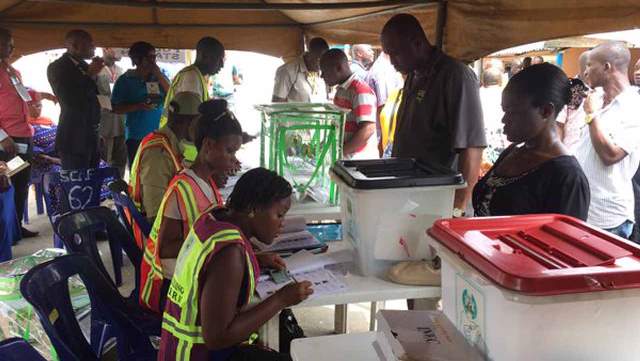
By Ahmed Aminu-Ramatu Yusuf
Nigeria’s forthcoming 2027 general elections are some twenty months away. The major political parties: the All Progressives Congress (APC), the African Democratic Congress (ADC), the Labour Party (LP) and the New Nigerian People’s Party (NNPP), are merely platforms for contesting elections, not ideologically grounded parties.
But the people are fatigued with their rhetorics, propaganda, and deception.Yet, the masses interestingly look forward to the 2027 elections. They are interested not so much in the parties or the presidential aspirants, but in their survival as human beings; the security to live, move, and work freely; and the protection of their ethnic identities.
The PDP might not pay much attention to the presidential election. But it will produce a candidate, mainly to register its presence in the election. Its candidate will not shine. The party will indirectly support the ADC, APC or LP candidate. Even so, its gladiators, activists, and followers will be divided, not unanimous, on which candidate to support.
But should former President Goodluck Jonathan decide to contest under the PDP, the chances of him winning the presidential election is high for five major reasons.
First, his simplicity, gentility, fairness to all, even at the expense of his ethnic group and zone, will count favourably for him. Besides, he is not a desperado – a do-or-die politician like late General Muhammadu Buhari, President Bola Ahmed Tinubu, Alhaji Atiku Abubakar, and Peter Obi.
Second, compared to General Olusegun Obasanjo, Buhari and Tinubu, Jonathan is widely and generally seen as saintly, a good manager of the economy, a man of the people, with the people in his heart, and a highly considerate person who is fair and just, not an ethnic bigot, religious zealot, regional hypocrite or political desperado.
Third, is the popular perception that Jonathan’s administration was unjustly and unfairly fought by the parochial and degenerate elements in APC and PDP and some Western powers, including the United States. Yes, people will say he was successfully voted out, but the fact is that he willingly, without much ado, handed over power to Buhari, and avoided the bloodshed Buhari and his hardcore supporters wanted.
But what are the results of throwing Jonathan out? Gross devaluation of the naira. Steep increases in the cost of petroleum products and electricity. A runaway inflation. High insecurity, poverty, hunger, suffering, misery, diseases, out-of-school children, and avoidable pains.
Fourth, the insecurity, terrorism, banditry, genocide, infanticide, cannibalism, kidnapping for huge ransom, destruction of farms, raping of women, sacking of villages, seizure and renaming of villages, and various crimes against humanity mainly perpetuated by Fulani terrorists, will count in Jonathan’s favour.
Fifth, Jonathan will receive huge support in the North-West and Middle-Belt zones, because, as president, he did not trigger, justify, support, increase, or promote criminalities, terrorism, genocide, and crimes against humanity.
The Hausa masses will propagate that Jonathan constructed over five hundred Almajiri schools, which were destroyed during Buhari’s administration by people who parade themselves as “Arewa leaders”! They will also propagate that he fought Boko Haram to the best of his ability, but was betrayed by his trusted lieutenants, friends, and politicians from the same North.
But should Jonathan choose a Hausa politician, who has no solid ties with his people, and who is considered a puppet of the Fulani oligarchs, which encompasses politicians, traditional rulers, and clerics, amongst others, he will face mass rejection from the politically dormant but increasingly awakening Hausa majority. Also, lots of Middle-Belters will take to political cynicism, apathy, and inertia.
But should Jonathan not contest, then, Tinubu may continue to 2031. People will miserably and painfully vote for him on the basis that the devil you know is better than characters who you cannot exorcise their bigotry, cannot trust, are incurably deceptive, and extremely desperate.
Tinubu will win if he retains Kashim Shettima as his vice president. If, however, he makes a change, it has to be somebody like Borno State governor, Babangida Zulum. However, it is highly unlikely Zulum will accept such an offer, unless Shettima pressurises him to do so.
However, should Tinubu replace Shettima with Rabiu Kwankwaso of NNPP, he will be deserted in the North. Hausas and Middle-Belters will point out that Kwankwaso never vehemently criticised the raging terrorism and genocide in the North-West and Middle-Belt. Therefore, he is in support of it.
Also, Southern people are already propagating that the North-West has over-asserted its presence in the highest offices of the federation. So, they must be made to give way to others.
Kwankwaso, therefore, will not be of much electoral value for Tinubu. Kano State will be highly contested. NNPP might still retain Kano, but with a narrow margin. However, if an independent-minded Hausa person runs for the governorship, the chances of NNPP winning will be extremely low.
Also, Tinubu bringing down the cost of living, especially foodstuff, enhancing the value of the naira, reducing the cost of petroleum products, and giving handouts to the masses, will boost his chances. I foresee him opening the land borders for massive food importation. This will count favourably for him. After all, the high cost of foodstuffs is the major issue used by his Northern opponents to vilify him.
Should Jonathan contest, Obi will be relegated to the background. Should Abubakar Atiku emerge as the ADC candidate, Hausas, Middle-Belters, and the people in the South would rather off-load their votes than risk Atiku giving Tinubu problems.
Atiku does not stand much chance of winning the presidential election. Basically, most Nigerians believe in, stand for, and are willing to ensure the unwritten zoning formula of North-South is respected and upheld. So, let the 2027 election be amongst Southern presidential candidates. If this were to be the case and, Jonathan does not contest, then the primary contest will be between Tinubu and Obi.
But, should Atiku insist on contesting, his Fulani ethnic background will negatively count against him.
First, most Nigerians widely believe that the Fulani have dominated the Nigerian political scene since independence. This has seen them produce two military Heads of State, two civilian presidents, and directly or indirectly installed and controlled a Prime Minister and five other military leaders. So let them give others a chance.
Second the activities of Fulani terrorists have generated popular dissatisfaction, distrust, and dislike for the Fulani people. Given their experience with Buhari, majority of non-Fulani people are not ready to risk having another Fulani in power so soon.
Third, the quietness, non-condemnation, and rationalisation of terrorism by the Fulani oligarchs create the impression that they are tacitly continuing the expansionism of Usmanu Dan Fodiyo, and trying to take over Nigeria and settle Fulanis from all over West and Central Africa in it.
Fourth, the increasing grounding of radical Hausa nationalism and irredentism, led by Hajiya Kaltum Alumbe Jitami, is tremendously promoting Hausa identity, confidence, and unity. She is politically awakening Hausas; ideologically radicalising them; and religiously, politically and culturally distancing them from the Fulanis.
Jitami’s propagation that, while our common humanity matters, our ethnic identities supersede and override our religious and regional togetherness, is shattering the regional – “Arewa” – identity; and blasting the formidable religious identities that had been used to politically dis-unite, and handover people to their preferred politicians.
Jitami’s conscientisation is progressively uniting Hausa and Middle-Belters. All are presently airing and asserting their indigenous identities and rendering the religious and regional cloak that had hitherto camouflaged the Fulani agenda.
The 2027 elections will surely expose the decaying and moribund lumpen democracy in the country. But they will also expose the ever-increasing contradictions and antagonisms within the dominant forces, and between the latter and the popular masses.
Ahmed Aminu-Ramatu Yusuf worked as deputy director, Cabinet Affairs Office, The Presidency, and retired as General Manager (Administration), Nigerian Meteorological Agency, (NiMet). Email: aaramatuyusuf@yahoo.com
OPINION
President Tinubu, the North and Distortions of Politics

By Tunde Rahman
Two years in the saddle, has President Bola Tinubu undercut the North in running the country’s affairs and distributing political appointments and infrastructure? Has he reneged on the promise to the Northern elites three years ago in Kaduna that he would run an all-inclusive government, protect the national interest and be fair to the North?It was in a bid to answer these critical questions that governors, ministers and other top government functionaries from the Northern region converged on Arewa House, Kaduna on July 29 and 30, 2025, under the auspices of the Ahmadu Bello Memorial Foundation as, to present their scorecards and tell the region what they had all done for it since May 2023.
Ultimately, the intervention by the governors and government functionaries yielded a verdict that outrightly rejected what the questions inherently suggest. They reeled out impressive strides recorded by the administration in infrastructure and security. According to them, President Tinubu has done a lot for the North. Whatever underdevelopment in the region should not be attributed to him but to Northern leaders who neglected the area for many years. However, it was apparent that the motive beneath the frenzied conversation about the Tinubu administration’s achievements is not so much what the President has done–or not done–for the North regarding distribution of national offices and infrastructure. It was, essentially, the interests of some Northern elites angling to shape political decisions and the politics of 2027 at play. As my friend, the Publisher of The Cable and former Editor of Thisday, Simon Kolawole, would say, “it’s all politics”, and this time, 2027 politics.It’s a page from an old politics playbook: couching the political elite’s views, opinions, and interests as those of the larger society where they operate. To achieve their aim, they deploy all kinds of subterfuge, including ethnicity or religion. Richard Sklar hints at this when he states that “tribalism is an instrument in the hands of political elites.”This is evident in the outburst of the New Nigeria Peoples Party leader, Senator Rabiu Musa Kwankwaso, who recently accused President Tinubu of marginalising the North in infrastructure development. However, available evidence points to the contrary. According to the Director-General, Budget Office, Dr. Tanimu Yakubu, who should know, more than half of the capital budgets for 2024 and 2025 were allocated to projects and programs in Northern Nigeria. “Contrary to politically-motivated narratives, Northern Nigeria is not on the margins; it is at the heart of federal investment priorities. Over 50% of the capital budget for 2024 and 2025 is traceable to projects and programs in the North when major national trunk infrastructure and water basin investments are properly accounted for,” he declaredTanimu outlined flagship projects and interventions that prove the administration’s commitment to developing the North. These include the Abuja–Kano Expressway dualization, ₦12.1 trillion Sokoto–Badagry Superhighway, the most ambitious cross-regional road project in decades, spanning 1,068 km, costing ₦3.63 trillion, with 30% of it already approved by President Tinubu for the project’s initial rollout in Sokoto and Kebbi; Kano–Maradi Standard Gauge Railway, a Sahel trade corridor enabler; Zungeru–Kano Power Transmission Line, boosting industrial power supply; Funtua and Bauchi Inland Dry Ports for agro-export and logistics; and Expansion of Airport Runways in Katsina, Maiduguri and Kaduna. But first, there’s a need for recourse to Tinubu’s promise to the North before he was elected president. On October 17, 2022, Tinubu came before the Northern elite to present his agenda for the region and solicit their votes. This was in the run-up to an election where former vice president Atiku Abubakar, the Peoples Democratic Party candidate in the poll, had fouled the air, fanning the embers of ethnicity, telling the North he belonged to it and was the best candidate to protect the Northern interest. There was tension in the land. The nation’s fault lines were being toyed with. Atiku’s erstwhile presidential running mate in the 2019 election, who had become the Labour Party candidate, Mr. Peter Obi, was also unrelenting, ratcheting up ethnic and religious sentiments for his candidacy.It was against this backdrop that Tinubu mounted the podium at the Arewa House. Tinubu and Atiku were leading other candidates in the North at the time. Thus, the North had become divided, and the atmosphere at the talks venue was charged. In a measured but purposeful tone, Tinubu told the gathering that as president, he would consolidate on the investments of the late President Buhari administration in all sectors to build on the gains recorded. He spoke of his plans to ensure that insecurity was nipped in the bud in the North and across the country, harness the resources that abound in every part of the nation for greater economic development, and utilise the country’s vast natural resources through strategic investment in infrastructure. Speaking specifically and cautiously on his plans for the North, he said, among other things, that the region has a comparative advantage in agriculture, and that under his presidency, the North would emerge as the hub of agribusiness in Africa through massive investment in the sector in collaboration with the private sector. “Agriculture is of special interest to me. It is both an economic and existential issue for every country. Experience in the last seven years has shown the potential of agriculture in solving the problem of unemployment and boosting our GDP,” he said. On his plans for education and reducing out-of-school children in the North, he said that working with both states and local governments to reform and retool the system, he would provide the required leadership and mobilise investment for the sector’s development. According to him, these reforms will give special attention to the welfare and training of teachers and lecturers as necessary catalysts for the better system the North desires.He identified some priority roads and hydropower projects in the North that had either not been followed through on, and new ones he would introduce to aid the region’s development.His lucid presentation and the way and manner in which he calmly but firmly responded to the questions thrown at him were pretty impressive. I know this as a fact because I was there. With that event, the North and Tinubu entered into a pact. In the 2023 presidential election results, the North voted well for Tinubu, giving him about 60% of the votes that brought him to power.Are there gaps in what he promised the North and what he delivered to them? Has President Tinubu mistreated the North two years down the road? I do not think so! The President has kept faith with his promise. However, there is room for improvement. Ongoing projects in the North, like the Sokoto-Badagry Highway, Abuja-Kaduna-Kano reconstruction work, Mambilla Hydroelectric Dam, Baro Inland Port, and Ajaokuta Steel Mill, should be vigorously pursued. The views expressed at the Kaduna two-day summit titled “Assessing Electoral Promises: Fostering Government-Citizens’ Engagement for National Unity” were interesting, though admittedly mixed. The Chairman of the Arewa Consultative Forum (ACF) Board of Trustees, Bashir Dalhatu, alleged that the Tinubu government had neglected the region, especially in its budget allocations and infrastructural development. “Two years into President Tinubu’s four-year tenure, the feeling among the people of the North is, to put it mildly, completely mixed,” he said, citing specific federal budget figures to underscore the alleged neglect. Some contrasting submissions offset such a grim prognosis. Kaduna State Governor Uba Sani and Governor Inuwa Yahaya of Gombe State said the President is committed to fulfilling his promises to the North. At the same time, Secretary to the Government of the Federation George Akume affirmed that President Tinubu’s administration would leave no region behind. Vice President Kashim Shettima, represented by Dr. Aliyu Moddibo, his Special Adviser on General Duties, noted that the current administration’s inclusive reforms were in line with Nigerians’ economic reality.Minister of Budget and National Planning Atiku Bagudu stated that the administration is implementing policies to transform Nigeria’s economy and fulfil the promises made to Nigerians. “The President has complete faith in Nigeria. He does not make decisions based on ethnicity or region. His government is rooted in fairness and inclusivity,” he said.On the fight against banditry and terrorism, National Security Adviser (NSA) Nuhu Ribadu said the Tinubu administration had made giant strides in protecting lives and properties. Ribadu said Nigerian security forces had subdued and eliminated some of the terrorist leaders, who had unleashed terror along the Kaduna-Abuja highway, making it safer for travellers. The NSA noted that the once-troubled highways from Zamfara to Katsina, Kaduna-Abuja, and Kaduna to Birnin Gwari, which were a nightmare for travellers, can now be travelled at night due to security improvements. “Politics will not allow people to credit us for all that,” he added.In the final analysis, the Kaduna Governor gave the Northern leaders food for thought when he declared that the Northern woes should not be blamed on President Tinubu. “Yes, President Tinubu made promises. But let’s be honest: he has kept faith with the North in many critical areas – security, agriculture, education, and economic inclusion. The real question is, have we kept faith with our people as Northern leaders?”Rahman is Senior Assistant to the President on Media & Special Duties.OPINION
BBNaija, NLNG Prizes and the Question of National Priorities
By Zayd Ibn Isah
When Olubunmi Familoni won the $100,000 Nigerian Prize for Literature last year with his children’s book The Road Does Not End, I was deeply disappointed that he didn’t even trend on social media.Had he been a Big Brother Naija winner, he would have dominated headlines, trended across platforms, and brands would be falling over themselves to offer him endorsements.
He might even have been given an appointment by his state governor as SSA on Entertainment, because our leaders understand us very well. They know what we value and where our priorities lie.In the midst of that disappointment, I wrote an article titled “Nigerians and Our Priorities”, which was published by Daily Trust and other outlets. Nearly a year later, I feel compelled to revisit the topic, because nothing has changed. We still hold the entertainment industry in higher esteem than other sectors.That’s why when many of us criticised Mr. President for hosting the Super Falcons and their coaching staff at the Presidential Villa, where he showered them with cash gifts, houses, and national honours for, of course, bringing glory to Nigeria by winning the African Women’s Cup of Nations in Morocco for a record tenth time, I was surprised by the backlash. Is it not the same footballers most of us are praying our children become, so they can make generational wealth?We Nigerians are fascinating as a people. This is because we are often quick to hold our leaders accountable while ignoring our own shortcomings.Today, unless you are in the entertainment industry, your chances of being recognised and celebrated at home as a creative writer or scientific inventor are slim. Most of the writers and inventors we know and celebrate today are only recognised because they are globally acclaimed. Take, for instance, the Nigerian Prize for Science and the Nigerian Prize for Literature, two of the continent’s most prestigious awards, each worth $100,000.Despite the enormous cash rewards attached to these academic and literary prizes, the awards as a whole hardly generate a fraction of the buzz that surrounds a single season of BBNaija among Nigerians, especially the youths.In particular, the Nigerian Prize for Literature is an annual award sponsored by NLNG, established in 2004. It operates on a four-year cycle, rotating through four genres: prose fiction, poetry, drama, and children’s literature. Prose fiction usually generates more interest than the other three genres, so there’s a lot of buzz in literary circles surrounding this year’s longlist.The shortlist for this year features acclaimed writers like Abubakar Adam Ibrahim, Chigozie Obioma, Yewande Omotoso, Uwem Akpan, Michael Afenfia, and Chika Unigwe. These are all authors whose works have received global praise, although not as much as the likes of Prof. Wole Soyinka, Chinua Achebe, and Chimamanda Ngozi Adichie.Still, it is disappointing how as a society we have failed to fully celebrate their importance. It is also amusing how such formidable writers would have to double their hustles if they were to want a seat at the table with Big Brother Naija housemates and other entertainment figures.I can never fully wrap my mind around the fact that these remarkable writers have contributed far more to Nigeria’s creative history than BBNaija housemates—all to barely known outside literary circles. It is even more annoying when you consider how some BBNaija housemates immediately become folk legends after entering Biggie’s house to dance, eat, parade in near nudity, and even indulge in sexual acts under the full view of cameras.As we often say in pidgin, “This life no just balanced at all.”If you’ve been following the trends on X (Twitter), you would have noticed that since this year’s BBNaija housemates entered the house, their names have been trending nonstop. And volunteers are already campaigning for votes for their favourites to win.At this point, we must ask: Why do we, as a people, invest such disproportionate attention in fleeting entertainment spectacles like BBNaija, where religious immorality and social irresponsibility are the order of the day, while ignoring initiatives that actually contribute to our intellectual, cultural, and national development? Isn’t this, too, a form of misplaced priority?In “Nigerians and Their Priorities”, I made a similar argument. Permit me to paraphrase here:“Our society places more emphasis on celebrity culture, political drama, and viral content than on intellectual achievement. Familoni’s brilliant portrayal of Nigerian life and culture deserved to be a national conversation. Yet, how many Nigerians have even heard of his book, let alone read it?”We live in a time when the sensational is preferred over the substantial, the trending over the timeless. From politics to pop culture, we elevate the fleeting while ignoring the foundational.Why is it that as a country, we seem to prioritise fleeting trends over lasting influence, and the sensational over the substantial? Why do political scandals, social media trends, and celebrity culture often dominate our conversations, while achievements in literature, science, sports and other fields often fly low under our collective radar?It is even more tragic when you realize that many Nigerians do not read, and rarely even see the act of reading as a leisurely activity. Even in universities, undergraduates only read to pass exams and make grades.Outside of that academic context, there’s little interest in literature. And if one doesn’t care for books at all, he or she would care less about the people who write them in the first place. Little wonder we end up producing educated illiterates as thousands of graduates emerge from our universities.So again, I ask: What are our national priorities? And are they aligned with the future we claim to desire? For decades our literary output as a nation has been the one thing which has consistently placed Nigeria in a good light. Now, we cannot afford to neglect this great literary heritage and nurture shallow things instead.It is noble to hold our leaders accountable, but we must extend that accountability inward. We are not merely the governed. We are the future governors. And the values we nurture today will determine the kind of nation we lead tomorrow.Zayd Ibn Isah can be reached at lawcadet1@gmail.com
